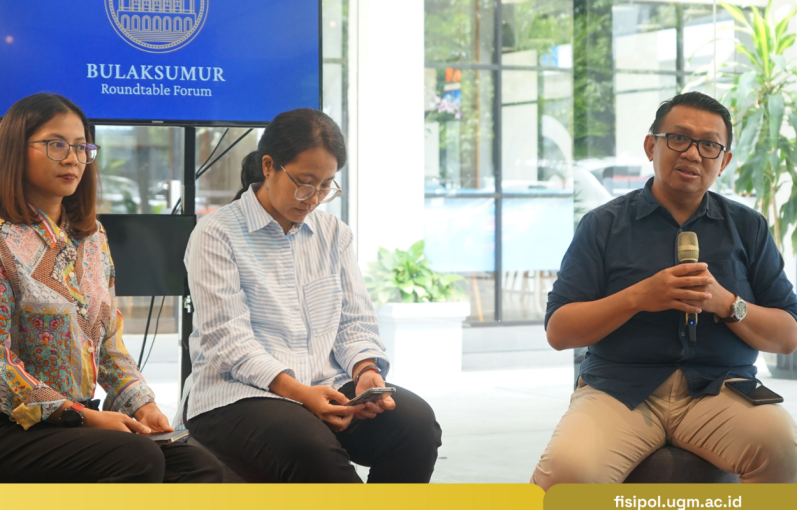
Yogyakarta, 7th of August 2024—The government of Indonesia is currently facing a dilemma regarding the issue of both the environment and the economy. Before, attempts made by the government to solve these problems often backfired and contradicted each other. On one hand, the government has committed to the reduction of greenhouse gas emissions, which of course is one of the main causes of climate change. This move by the government is directly based on Indonesia’s Enhanced Nationally Determined Contribution (ENDC). On the other hand, the Indonesian government is also committed to increase economic growth, so that it does not fall into the middle income trap.
“This, of course, becomes a dilemma for policymakers, as the Indonesian economy is still reliant towards extractive industries, which contradicts the ENDC targets set,” spoke Hasrul Hanif, a lecturer from the Department of Politics and Governance of Fisipol UGM in the Press Conference of the Bulaksumur Roundtable Forum on Wednesday (7/8) in the BRIwork building of Fisipol UGM. In formulating a solution for the dilemmas mentioned above, Hanif noted that collaboration is especially key. Since, things that are related to these issues are inherently multi-sectoral, and therefore it bypasses both administrative jurisdiction and the global-local category.
Coming from this dilemma, the Department of Politics and Governance of UGM initiated the Bulaksumur Roundtable Forum (BRF). a national dialogue forum which will discuss the many issues related to sustainable development in Indonesia. The BRF itself is part of the Collaborative Hub for Politics and Policy on Sustainability (CoPPS), an initiative by the Department of Politics and Governance of UGM and Pares (Center for Political Risk Analyst), in order to encourage further integration of sustainable initiatives in Indonesia’s political landscape. “The focus itself is towards the issue of sustainability, with two focus areas, such as the green economy and the blue economy,” explained Ian Agisti, the Program Lead for CoPPs.
The BRF plays an important role in bridging the communication between all of the stakeholders. Dialogues created in this forum are expected to mediate climate change as well as balance the risks and burdens across regions. This initiative is in line with the UN’s Sustainable Development Goals, especially SDG 10 Reduced Inequalities, SDG 11 Sustainable Cities and Communities, as well as SDG 13 Climate Action.
The Bulaksumur Roundtable Forum will be held the first time on Friday (9/8), with the main topic of the reorientation of decentralization and regional autonomy as well as economic development and its challenges towards the bigger picture of sustainable development. After that, the Bulaksumur Roundtable Forum will be held routinely two times a year.
